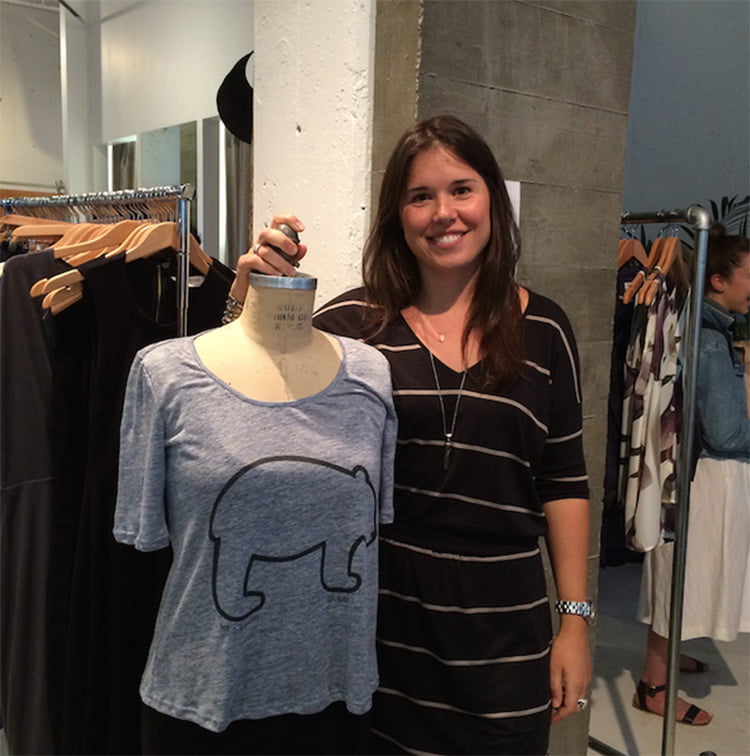Forest Love Trending with Nicole Bridger and Canopy
Published:
Author:
Aurora Tejeida
Campaign:
CanopyStyle
Type:
Blog article
Published:
Author: Aurora Tejeida
- Campaign:CanopyStyle
- Type: Blog article
 Environmental not for profit Canopy has been thrilled to partner with Vancouver designer Nicole Bridger to start a fresh trend for forest conservation within the global fashion industry. Nicole was the first designer to support the CanopyStyle initiative prior to the campaign’s launch in 2013. Right away we realized there was strong alignment between our efforts at Canopy and how Nicole operated her fashion line with a commitment to the earth and its people.
Environmental not for profit Canopy has been thrilled to partner with Vancouver designer Nicole Bridger to start a fresh trend for forest conservation within the global fashion industry. Nicole was the first designer to support the CanopyStyle initiative prior to the campaign’s launch in 2013. Right away we realized there was strong alignment between our efforts at Canopy and how Nicole operated her fashion line with a commitment to the earth and its people.Beginning with Nicole Bridger’s enthusiastic participation, over 25 designers, brands and retailers have now embraced the CanopyStyle initiative, committing to eliminate endangered forests from cellulosic fabrics such as rayon, viscose and modal. Canopy’s partners include Stella McCartney, H&M, Zara/Inditex, EILEEN FISHER, Levi Strauss & Co. and many more. The commitments of fashion brands and designers have catalyzed similar fibre sourcing policies by global viscose producers Lenzing and Aditya Birla. The steps the clothing sector is taking for the future of the world’s forests builds on and enhances the efforts of Canopy’s corporate partners to increase sustainability in the print and paper sector.
Two years ago, Canopy research established the surprising link between forests and fabrics. The Canopy team has traced forest fibre from mall racks, to viscose production in China, right back to the giant dissolving pulp mills in Canada, Indonesia and Brazil that crank out pulp that is made into rayon. Then we followed the thread further to the source of the trees: the ancient temperate rainforests and vast Boreal forests of North America, and the threatened tropical rainforests of Indonesia. Canopy estimates that 70-100 million trees are pulped for viscose fabric annually, at least one third of them from controversial fibre sources and endangered forests.
For this reason, leading brands and designers like Nicole Bridger are looking to shift to alternatives including recycled fabrics, non-wood alternatives such as fabrics made from agricultural residues like flax straw, and, where tree fibre is used, eco-certified Forest Stewardship Council plantations.
The most engaged of our partners are also keen to actively join in supporting landmark conservation solutions for endangered forest ecosystems. One of the most meaningful and iconic of these is the Great Bear Rainforest. With ethereal white Spirit Bears roaming amidst thousand-year-old trees, British Columbia’s Great Bear Rainforest is a marvel.
The Great Bear Rainforests Agreements are nearing completion after over a decade of work. Although two million hectares of this globally rare forest have been protected to date, scientists flag that this is inadequate to maintain the medium – long-term health of the landscape and its species. As all parties work through the final steps to bring the Agreements to a close, Canopy and our allies are committed to ensuring that the level of conservation recommended by scientists to safeguard this remarkable ecosystem is achieved. The goal to maintain 70% of natural levels of old growth forests, through a combination of reserves and ‘lighter touch logging’ is key to the overall success of the Great Bear Rainforest Agreements. Canopy is closely tracking progress and encouraging BC’s provincial government to take the final, essential steps to realize the conservation potential of this global legacy in June.
As these efforts are ready to bear fruit, Canopy is excited to be co-hosting a magical evening in celebration of the Great Bear Rainforest with Nicole Bridger on Thursday May 28th from 7pm – 9pm.
You can purchase the Limited edition Bear Tee by Nicole Bridger here .








